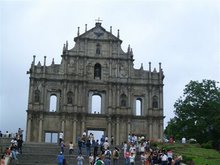 Estas três meninas (Carla, Patricia e eu) foram assitir ao ensaio do ano novo chinês porque nessa altura não vão estar por terras macaenses. Vamos para as FILIPINAS!!! Praia, mergulho e acção! (Pois não fomos....perdemos o voo...a história é daquelas que custa a acreditar ...... a verdade é que passar o ano novo chinês em Macau não é bom..... caso para dizer puto do azar!!)
Estas três meninas (Carla, Patricia e eu) foram assitir ao ensaio do ano novo chinês porque nessa altura não vão estar por terras macaenses. Vamos para as FILIPINAS!!! Praia, mergulho e acção! (Pois não fomos....perdemos o voo...a história é daquelas que custa a acreditar ...... a verdade é que passar o ano novo chinês em Macau não é bom..... caso para dizer puto do azar!!)Ainda não estou a viver com o Oscar na casa que vamos alugar:( Mas ao mesmo tempo tem sido muito bomm, pois tive a oportunidade de viver com a Patricia e o Pedro mesmo no centro de Macau (rua ao lado das Ruínas de São Paulo) e de momento vivo com a Carlita!! Já a Carlita vive no Nape, uma zona gira e o tenho a "sorte" de alegrar o meu dia com o fantástico sentido de humor da Carlita....acordamos e é logo tagarelar ao som de música....à noite é trocar mais umas de letra.....enfim a experiência em Macau não caiu em monotonia...... já vive com as duas GRANDES amigas de Macau. (um à parte se calhar desnecessário...mas cá vai: depois de nove meses na Taipa estava a precisar de mudar...do you know what i mean?)

A explicação desta festividade:
Chinese New Year starts with the New Moon on the first day of the new year and ends on the full moon 15 days later. The 15th day of the new year is called the Lantern Festival, which is celebrated at night with lantern displays and children carrying lanterns in a parade.
 The Chinese calendar is based on a combination of lunar and solar movements. The lunar cycle is about 29.5 days. In order to "catch up" with the solar calendar the Chinese insert an extra month once every few years (seven years out of a 19-yearcycle). This is the same as adding an extra day on leap year. This is why, according to the solar calendar, the Chinese New Year falls on a different date each year.
The Chinese calendar is based on a combination of lunar and solar movements. The lunar cycle is about 29.5 days. In order to "catch up" with the solar calendar the Chinese insert an extra month once every few years (seven years out of a 19-yearcycle). This is the same as adding an extra day on leap year. This is why, according to the solar calendar, the Chinese New Year falls on a different date each year.
New Year's Eve and New Year's Day are celebrated as a family affair, a time of reunion and thanksgiving. The celebration was traditionally highlighted with a religious ceremony given in honor of Heaven and Earth, the gods of the household and the family ancestors.
The sacrifice to the ancestors, the most vital of all the rituals, united the living members with those who had passed away. Departed relatives are remembered with great respect because they were responsible for laying the foundations for the fortune and glory of the family.
The presence of the ancestors is acknowledged on New Year's Eve with a dinner arranged for them at the family banquet table. The spirits of the ancestors, together with the living, celebrate the onset of the New Year as one great community. The communal feast called "surrounding the stove" or weilu. It symbolizes family unity and honors the past and present generations.





No comments:
Post a Comment